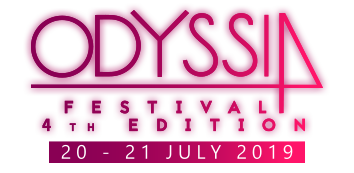Inspired by Homer’s, unique first epic poem in human history, “Odyssey”, the festival travels around in all day and night musics spinning; dancefloors vibrating; boat parties; performance arts & installations; traditional ethnic and fusion cooking; Mediterranean diet workshops; holistic wellbeing activities; diving; trekking; cycling; yoga; massage; spiritual & physical retreats; local customs; global ritual workshops and games of love.
The “Odyssia” is an international music culture festival consisting by a mosaic of activities which aim to inspire the global citizen’s will for adventure and mysticism.
The will to sense & feel deep in our hearts the power of the journey, the will to reach each one’s final destination, LOVE.
Thus creating the Odyssia festivals themes and editions.
Unique themes inspired from the most beautiful ancient epic poem.
The myth originated in more than 3.000 years ago in Greece and meant to travel from mouth to mouth, word by word, day by day, endlessly, to a destination that goes beyond time.
THE WORLD’S MOST ANCIENT EPIC POEM OF ALL TIMES
The Odyssey (/ˈɒdəsi/, Greek: Ὀδύσσεια Odýsseia, pronounced [o.dýs.sej.ja] in Classical Attic) is one of two major ancient Greek epic poems attributed to Homer. It is, in part, a sequel to the Iliad, the other work ascribed to Homer. The poem is fundamental to the modern Western canon, and is the second oldest extant work of Western literature, the Iliad being the oldest. Scholars believe it was composed near the end of the 8th century BC, somewhere in Ionia, the Greek coastal region of Anatolia.
The poem mainly focuses on the Greek hero Odysseus (known as Ulysses in Roman myths) and his journey home after the fall of Troy. It takes Odysseus ten years to reach Ithaca after the ten-year Trojan War.In his absence, it is assumed he has died, and his wife Penelope and son Telemachus must deal with a group of unruly suitors, the Mnesteres (Greek: Μνηστῆρες) or Proci, who compete for Penelope’s hand in marriage.
It continues to be read in the Homeric Greek and translated into modern languages around the world. Many scholars believe that the original poem was composed in an oral tradition by an aoidos (epic poet/singer), perhaps a rhapsode (professional performer), and was more likely intended to be heard than read.The details of the ancient oral performance, and the story’s conversion to a written work inspire continual debate among scholars. The Odyssey was written in a poetic dialect of Greek—a literary amalgam of Aeolic Greek, Ionic Greek, and other Ancient Greek dialects—and comprises 12,110 lines of dactylic hexameter.
Among the most noteworthy elements of the text are its non-linear plot, and the influence on events of choices made by women and slaves, besides the actions of fighting men. In the English language as well as many others, the word odyssey has come to refer to an epic voyage.
The Odyssey has a lost sequel, the Telegony, which was not written by Homer. It was usually attributed in antiquity to Cinaethon of Sparta. In one source, the Telegony was said to have been stolen from Musaeus by Eugamon or Eugammon of Cyrene, member of the “Cyclic poets”.
The epic poem of “Odysseia” is the fundamental source and code for the Odyssia’s festival community (the Odyssians) to base upon, visualize, be inspired and create the Odyssian’s manifesto of changing the world.


